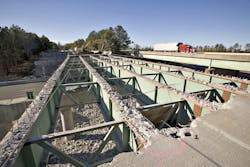Transportation funding not a Congressional priority, says LaHood
With what he termed a “hotly contested” election approaching in November, Ray LaHood – the former Secretary of the U.S. Department of Transportation and now senior policy advisor at the global law firm DLA Piper – says that crafting a long-term transportation funding solution is “not a priority” in Congress right now and that a short-term continuation of existing commitments using general fund revenues is likely to occur.
“Little if any progress will be made on any legislation that is even remotely controversial,” LaHood noted in a conference call with reports organized by Wall Street investment firm Stifel Nicolaus & Co. last Friday.
“In light of that, the existing transportation bill (MAP-21) will likely be extended beyond the end of the current fiscal year, which ends on September 30,” he said. “And with the Highway Trust Fund (HTF) likely to be fully drained by the end of August, Congress will most likely partially fund transportation projects out of the general fund from that point forward.”
LaHood added that current fuel taxes remain unadjusted for inflation since 1993 and simply do not generate enough revenue given both the significant increases in automobile fuel efficiency and per capita driving declines.
“What is needed is a strong five or six year bill that contains a vision for the future and adequate funding for all approved projects,” he explained, adding that in his opinion the two-year MAP-21 legislation “was little more than a two-year stop gap.”
LaHood also believes fuel taxes should be raised and then indexed to inflation as it still provides the bulk of funding for transportation projects at the national level. However, right now, the leadership in Congress seems unwilling or incapable of raising this politically charged tax.
He also things higher fuel taxes should be supplemented via increased tolling, a vehicle miles traveled or VMT tax, public private partnerships, TIFIA loans – a federally guaranteed loan program for transportation facilities/infrastructure projects – and TIGER Grants, which are federal grants awarded to the projects with the highest returns on investment.
In the LaHood’s opinion, a combination of all these and other funding sources – with states taking more matters into their own hands by raising state fuel taxes, building toll roads, or by earmarking a portion of state sales tax revenue for transportation projects – need to be considered in order to address what LaHood described as a “currently deteriorating situation” where transportation infrastructure is concerned.
Yet Pete Ruane, president of the American Road & Transportation Builders Association (ARTBA), explained in testimony before the U.S. Senate’s Environment & Public Works Committee back in February that federal funding is a critical ingredient to the most highly-traveled portions of the U.S. highway system – especially where commercial vehicles are concerned.
“Trucks carry freight worth more than $11 trillion over the nation’s roads and bridges every year, and nearly 75% of that travel takes place on the federal-aid system,” he explained. “Without that federal investment in these roads, trucking mobility and economic productivity are at risk.”
He added that ARTBA’s economics team analyzed the usage pattern of federal fuel tax dollars in 2012 and said the data showed federal transportation monies helped fund 12,546 capital improvement efforts – 7,335 roads, 2,407 bridges, and 2,804 road safety projects – all focused primarily on the system that moves most of that $11 trillion in freight movement.
One method being suggested to generate the necessary funds to accomplish all of that – what analysis by Congressional Budget Office (CBO) believes totals, on average, $16.3 billion annually just to preserve the current transportation program – is “value-added tolling,” an all-electronic tolling (AET) strategy that replaces standard toll collection booth structures as well as fuel taxes over time.
A recent study by the Reason Foundation concluded that AET tolling – which costs only 5% of collected revenues versus 20% to 30% of traditional toll booth structured systems – is what can generate the minimum $1 trillion its estimates is needed to upgrade and modernize the nation’s 47,000-mile highway system.
“This is a new model that would apply to newly tolled highways such as rebuilt interstates,” noted Robert Poole, Reason’s director of transportation policy. “Its aim is to make such tolling a true highway user fee, not a hybrid of toll and tax.”
Whatever the solution, though DLA Piper’s LaHood said it must be deployed sooner rather than later.
“The harsh winter, in many regions of the U.S., has left potholed highways everywhere and the [transportation] infrastructure of the U.S. may have never been in worse shape,” he explained during the Stifel conference call. “A near-term effort will have to be mounted just to restore functionality of the highway network.”
About the Author
Sean Kilcarr
Editor in Chief
Sean Kilcarr is a former longtime FleetOwner senior editor who wrote for the publication from 2000 to 2018. He served as editor-in-chief from 2017 to 2018.
